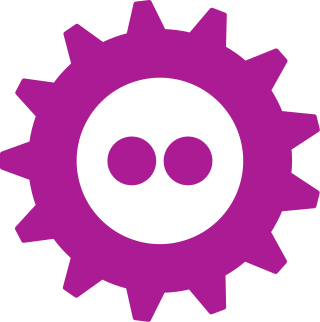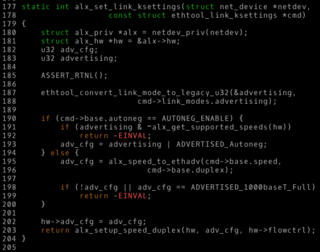Related Research Articles

PostgreSQL, also known as Postgres, is a free and open-source relational database management system (RDBMS) emphasizing extensibility and SQL compliance. PostgreSQL features transactions with atomicity, consistency, isolation, durability (ACID) properties, automatically updatable views, materialized views, triggers, foreign keys, and stored procedures. It is supported on all major operating systems, including Linux, FreeBSD, OpenBSD, macOS, and Windows, and handles a range of workloads from single machines to data warehouses or web services with many concurrent users.
In computer programming, unit testing is a software testing method by which individual units of source code—sets of one or more computer program modules together with associated control data, usage procedures, and operating procedures—are tested to determine whether they are fit for use. It is a standard step in development and implementation approaches such as Agile.
Web development is the work involved in developing a website for the Internet or an intranet. Web development can range from developing a simple single static page of plain text to complex web applications, electronic businesses, and social network services. A more comprehensive list of tasks to which Web development commonly refers, may include Web engineering, Web design, Web content development, client liaison, client-side/server-side scripting, Web server and network security configuration, and e-commerce development.

Free and Open source Software Developers' European Meeting (FOSDEM) is a non-commercial, volunteer-organized European event centered on free and open-source software development. It is aimed at developers and anyone interested in the free and open-source software movement. It aims to enable developers to meet and to promote the awareness and use of free and open-source software.

JDeveloper is a freeware IDE supplied by Oracle Corporation. It offers features for development in Java, XML, SQL and PL/SQL, HTML, JavaScript, BPEL and PHP. JDeveloper covers the full development lifecycle from design through coding, debugging, optimization and profiling to deploying.

Ruby on Rails is a server-side web application framework written in Ruby under the MIT License. Rails is a model–view–controller (MVC) framework, providing default structures for a database, a web service, and web pages. It encourages and facilitates the use of web standards such as JSON or XML for data transfer and HTML, CSS and JavaScript for user interfacing. In addition to MVC, Rails emphasizes the use of other well-known software engineering patterns and paradigms, including convention over configuration (CoC), don't repeat yourself (DRY), and the active record pattern.

PL/pgSQL is a procedural programming language supported by the PostgreSQL ORDBMS. It closely resembles Oracle's PL/SQL language. Implemented by Jan Wieck, PL/pgSQL first appeared with PostgreSQL 6.4, released on October 30, 1998. Version 9 also implements some ISO SQL/PSM features, like overloading of SQL-invoked functions and procedures.
CherryPy is an object-oriented web application framework using the Python programming language. It is designed for rapid development of web applications by wrapping the HTTP protocol but stays at a low level and does not offer much more than what is defined in RFC 7231.

Django is a free and open-source, Python-based web framework that runs on a web server. It follows the model–template–views (MTV) architectural pattern. It is maintained by the Django Software Foundation (DSF), an independent organization established in the US as a 501(c)(3) non-profit.

Catalyst is an open source web application framework written in Perl, that closely follows the model–view–controller (MVC) architecture, and supports a number of experimental web patterns. It is written using Moose, a modern object system for Perl. Its design is heavily inspired by frameworks such as Ruby on Rails, Maypole, and Spring.

Apache Log4j is a Java-based logging utility originally written by Ceki Gülcü. It is part of the Apache Logging Services, a project of the Apache Software Foundation. Log4j is one of several Java logging frameworks.

Steven Feuerstein is an author focusing on the Oracle database PL/SQL language, having written ten books on PL/SQL, and one book on mySQL, all published by O'Reilly Media. His signature book, Oracle PL/SQL Programming, which many consider the "bible" for PL/SQL developers, was first published in September 1993. It has grown from 916 pages in 1993 to over 1000 pages in its 6th edition, published 20 years later.
Laminas Project is an open source, object-oriented web application framework implemented in PHP 7 and licensed under the New BSD License. The framework is basically a collection of professional PHP-based packages. The framework uses various packages by the use of Composer as part of its package dependency managers; some of them are PHPUnit for testing all packages, Travis CI for continuous Integration Services. Laminas provides to users a support of the model–view–controller (MVC) in combination with Front Controller solution. MVC implementation in Laminas has five main areas. The router and dispatcher functions to decide which controller to run based on data from URL, and controller functions in combination with the model and view to develop and create the final web page.
IronRuby is an implementation of the Ruby programming language targeting Microsoft .NET Framework. It is implemented on top of the Dynamic Language Runtime (DLR), a library running on top of the Common Language Infrastructure that provides dynamic typing and dynamic method dispatch, among other things, for dynamic languages.
Heroku is a cloud platform as a service (PaaS) supporting several programming languages. As one of the first cloud platforms, Heroku has been in development since June 2007, when it supported only the Ruby programming language, but now also supports Java, Node.js, Scala, Clojure, Python, PHP, and Go. For this reason, Heroku is said to be a polyglot platform as it has features for a developer to build, run and scale applications in a similar manner across most of these languages. Heroku was acquired by Salesforce in 2010 for $212 million.

SonarQube is an open-source platform developed by SonarSource for continuous inspection of code quality to perform automatic reviews with static analysis of code to detect bugs and code smells on 29 programming languages. SonarQube offers reports on duplicated code, coding standards, unit tests, code coverage, code complexity, comments, bugs, and security recommendations.
The RubySpec project aimed to write a complete executable specification for the Ruby programming language. This project contains specs that describe Ruby language syntax and standard library classes. The project contains two main components:

Snake case is the naming convention in which each space is replaced with an underscore (_) character, and words are written in lowercase. It is a commonly used naming convention in computing, for example for variable and subroutine names, and for filenames. One study has found that readers can recognize snake case values more quickly than camel case. However, "subjects were trained mainly in the underscore style", so the possibility of bias cannot be eliminated.

Fat-Free Framework is an open-source web framework distributed under the GNU General Public License and hosted by GitHub and SourceForge. The software seeks to combine a full featureset with a lightweight code base while being easy to learn, use and extend.
References
- ↑ "rsim/ruby-plsql-spec". GitHub. Retrieved 2016-03-14.
- ↑ Simanovskis, Raimonds. "Oracle PL/SQL unit testing with Ruby". blog.rayapps.com. Retrieved 2016-03-14.